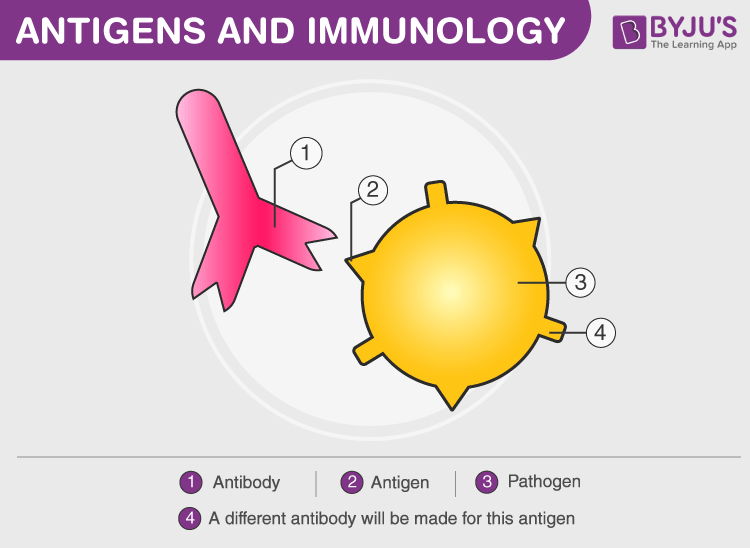What is an Antigen?
“An antigen is a molecule that initiates the production of an antibody and causes an immune response.”
Antigens are large molecules of proteins, present on the surface of the pathogen- such as bacteria, fungi viruses, and other foreign particles. When these harmful agents enter the body, it induces an immune response in the body for the production of antibodies.
For example: When a common cold virus enters the body, it causes the body to produce antibodies to prevent from getting sick.
Also Read: Difference between B cells and T cells

Properties of Antigens
The properties of antigens are as follows:
- The antigen should be a foreign substance to induce an immune response.
- The antigens have a molecular mass of 14,000 to 6,00,000 Da.
- They are mainly proteins and polysaccharides.
- The more chemically complex they are, the more immunogenic they will be.
- Antigens are species-specific.
- The age influences the immunogenicity. Very young and very old people exhibit very low immunogenicity.
Also Read: Role of Antibodies
Types of Antigens
On the basis of Origin
There are different types of antigens on the basis of origin:
Exogenous Antigens
Exogenous antigens are the external antigens that enter the body from outside, e.g. inhalation, injection, etc. These include food allergen, pollen, aerosols, etc. and are the most common type of antigens.
Endogenous Antigens
Endogenous antigens are generated inside the body due to viral or bacterial infections or cellular metabolism.
Autoantigens
Autoantigens are the ‘self’ proteins or nucleic acids that due to some genetic or environmental alterations get attacked by their own immune system causing autoimmune diseases.
Tumour Antigens
It is an antigenic substance present on the surface of tumour cells that induces an immune response in the host, e.g. MHC-I and MHC-II. Many tumours develop a mechanism to evade the immune system of the body.
Native Antigens
An antigen that is not yet processed by an antigen-presenting cell is known as native antigens.
On the Basis of Immune Response
On the basis of the immune response, antigens can be classified as:
Immunogen
These may be proteins or polysaccharides and can generate an immune response on their own.
Hapten
These are non-protein, foreign substances that require a carrier molecule to induce an immune response.
Also Read: Immunity
Structure of Antigens
The epitopes or antigenic determinants are the components of antigen. Every antigen has several epitopes. An antibody has at least two binding sites that can bind to specific epitopes on antigens.
The antigens combine with the antibody according to the lock and key mechanism.
The ability of the body to act against the disease-causing agents and antigens by the immune system is termed as the immunity. This immunity may be either inborn or acquired from vaccinations.
Also Read: Human Diseases
Let us explore more about antigens, its definition, types, structure and properties by referring to the BYJU’S website.
Frequently Asked Questions
What are antigens?
Antigens are molecules that trigger the production of antibodies by inducing an immune response.
What is Immunization?
Immunization is the process of activating the person’s immune system, typically by the administration of a vaccine. This process helps an individual to protect against subsequent infection or dreadful disease.
What is Immunology?
Immunology is a branch of biology, which mainly deals with the study about the human immune system, types of the immune system, its functions and how our body protects itself against infectious diseases caused by microorganisms and infectious agents.
What are the different types of Immunity?
There are two major types of immunity:
- Innate immunity — It is also called as the natural immunity, as it is inherited from the parents to their young ones and protects from birth throughout life.
- Acquired immunity– It is also called as the adaptive immunity, as it is acquired after the birth in the form of vaccination, antibiotics, Immunization, etc.

It’s useful to study for exams
Information is so relevant and easily understandable